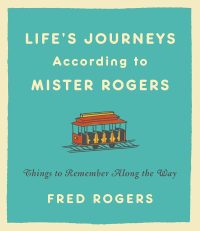It’s fitting that Joanne Rogers, Fred Roger’s wife, would open Life’s Journeys According to Mister Rogers. Written in 2005, two years after Fred’s death and using his quotes, the book pays homage to his wisdom. However, It’s Joanne’s wisdom and peace that is striking. “When the day turns into night, / And you are way beyond my sight, / I think of you.” As openings go, it’s powerful. It sets the tone for a journey through Fred’s beliefs and his view of life.
Fascinating Journeys
One of the resounding thoughts that comes across, both here and in other works written about Rogers, is that he was always interested in others and trying to connect. (See The Good Neighbor, The Simple Faith of Mister Rogers, and The Mister Rogers Effect for other works on Rogers.) Rogers didn’t need a guide like James Spradley wrote in The Ethnographic Interview; he naturally looked for ways to learn about other people. His heart seemed to have room for everyone. Despite keeping 80 hour weeks during production season, he’d find ways to listen to anyone who he ran into – especially children.

Mentionable and Manageable
They’re the words that Rogers used in a famous congressional testimony before Senator Pastore. He felt that emotions should be mentionable, and through that, they’d become more manageable. He was chided for his “touchy-feely” approach. He was teaching social-emotional learning well before it was fashionable. Somehow, he knew that the development of a child into an adult required learning how to work with emotions.
Gentle Roots
We are too often not gentle with ourselves. We rush through our days criticizing what we didn’t get done, what we don’t know, and how we could have – or should have – done better. However, if we want to discover who we really are, we need to get to the roots, and roots are fragile things that need to be treated gently. They’re the place from which we pull our nutrition and strength. Without them, we’ll be left adrift in the journey of life.
You Contains Multitudes
It was Walt Wittman who wrote, “Do I contradict myself? / Very well then, I contradict myself, / (I am large, I contain multitudes.)” However, it speaks to Rogers’ perspective that you shouldn’t let any one thing define you. You’re not your job description, the awards you’ve received, or even the things you’ve done. You are unique and special “just the way you are.” It’s too easy to simplify ourselves to the trivial and meaningless things that exist in life and, in doing so, ignore the special, unique person inside of each of us.
Pulling Away
Rogers’ son, Jim, for a time stopped talking to his parents. Rogers commented, “the different generations within a family may have to pull apart for a while for each to find its own healthy identity.” I don’t know that it was his recollection of the story of the prodigal son or a wisdom that his son would likely return. It doesn’t minimize the pain that he and Joanne felt at the distance – but it affirms the need for individualization, as Erik Erikson discovered (see Childhood and Society). Rogers and Erikson were well acquainted through work at the Arsenal Nursery School. It would have been hard to grow up with someone so revered as Rogers as a father. Either way, it just shows that there are reasons for temporary estrangement in every family. (See Fault Lines.)
Speaking and Listening
“We speak with more than our mouths. We listen with more than our ears.” We speak louder with our actions. There are numerous accounts of Rogers taking time that he didn’t have to make phone calls, respond to letters, or generally connect with those who were kind enough to reach out to him. Our actions speak volumes. (See also Heroic Leadership.)
Listening goes beyond the simple conversion of air pressure waves into electrical impulses in the brain. Hearing and listening aren’t synonymous. Listening involves an intent to understand what is being said, to compare it to what we know, and, most importantly, to be curious.
Transitions
This book was assembled after Rogers’ transition to death. While death has a special level of grief associated with it, every transition has loss and grief. (See Managing Transitions for more.) Rogers knew that there is a final transition at the end of his life’s journey. There’s a peace in understanding Life’s Journeys According to Mister Rogers.


No comment yet, add your voice below!